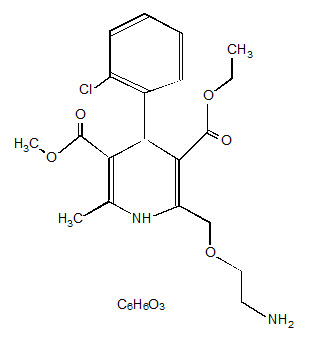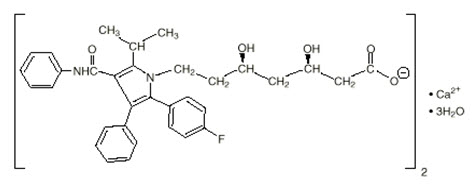Caduet
Generic name: amlodipine and atorvastatin
Drug classes: Antihyperlipidemic combinations, Miscellaneous antihypertensive combinations
Medically reviewed by A Ras MD.
What is Caduet?
Caduet is a prescription medicine that is used to treat high blood pressure. It is used to lower bad cholesterol and raise good cholesterol (HDL). Caduet is also used to lower triglycerides. It is used to treat some types of chest pain (angina). It is used to lower the chance of heart attack, stroke, and death in some people.
Caduet may be given to you for other reasons. Talk to your doctor.
Description
CADUET (amlodipine and atorvastatin) tablets combine the calcium channel blocker amlodipine besylate with the HMG CoA-reductase inhibitor atorvastatin calcium.
Amlodipine besylate is chemically described as 3-ethyl-5-methyl (±)-2-[(2-aminoethoxy)methyl]-4-(o-chlorophenyl)-1,4-dihydro-6-methyl-3,5-pyridinedicarboxylate, monobenzenesulphonate. Its empirical formula is C20H25ClN2O5∙C6H6O3S.
Atorvastatin calcium is chemically described as [R-(R*, R*)]-2-(4-fluorophenyl)-ß, δ-dihydroxy-5-(1-methylethyl)-3-phenyl-4-[(phenylamino)carbonyl]-1H-pyrrole-1-heptanoic acid, calcium salt (2:1) trihydrate. Its empirical formula is (C33H34 FN2O5)2Ca∙3H2O.
The structural formulae for amlodipine besylate and atorvastatin calcium are shown below.
|
|
|
| Amlodipine besylate | Atorvastatin calcium |
CADUET contains amlodipine besylate, a white to off-white crystalline powder, and atorvastatin calcium, also a white to off-white crystalline powder. Amlodipine besylate has a molecular weight of 567.1 and atorvastatin calcium has a molecular weight of 1209.42. Amlodipine besylate is slightly soluble in water and sparingly soluble in ethanol. Atorvastatin calcium is insoluble in aqueous solutions of pH 4 and below. Atorvastatin calcium is very slightly soluble in distilled water, pH 7.4 phosphate buffer, and acetonitrile; slightly soluble in ethanol; and freely soluble in methanol.
CADUET is available as film-coated tablets containing:
- 5 mg amlodipine equivalent to 6.9 mg amlodipine besylate and 10 mg atorvastatin equivalent to 10.4 mg atorvastatin calcium.
- 5 mg amlodipine equivalent to 6.9 mg amlodipine besylate and 20 mg atorvastatin equivalent to 20.7 mg atorvastatin calcium.
- 5 mg amlodipine equivalent to 6.9 mg amlodipine besylate and 40 mg atorvastatin equivalent to 41.4 mg atorvastatin calcium.
- 5 mg amlodipine equivalent to 6.9 mg amlodipine besylate and 80 mg atorvastatin equivalent to 82.9 mg atorvastatin calcium.
- 10 mg amlodipine equivalent to 13.9 mg amlodipine besylate and 10 mg atorvastatin equivalent to 10.4 mg atorvastatin calcium.
- 10 mg amlodipine equivalent to 13.9 mg amlodipine besylate and 20 mg atorvastatin equivalent to 20.7 mg atorvastatin calcium.
- 10 mg amlodipine equivalent to 13.9 mg amlodipine besylate and 40 mg atorvastatin equivalent to 41.4 mg atorvastatin calcium.
- 10 mg amlodipine equivalent to 13.9 mg amlodipine besylate and 80 mg atorvastatin equivalent to 82.9 mg atorvastatin calcium.
Each film-coated tablet also contains calcium carbonate, croscarmellose sodium, microcrystalline cellulose, pregelatinized starch, polysorbate 80, hydroxypropyl cellulose, purified water, colloidal silicon dioxide (anhydrous), magnesium stearate, Opadry® II White 85F28751 (polyvinyl alcohol, titanium dioxide, PEG 3000, and talc) or Opadry® II Blue 85F10919 (polyvinyl alcohol, titanium dioxide, PEG 3000, talc, and FD&C blue #2).
12.1 Mechanism of Action
CADUET is a combination of two drugs, a dihydropyridine calcium channel blocker (amlodipine) and an HMG-CoA reductase inhibitor (atorvastatin). The amlodipine component of CADUET inhibits the transmembrane influx of calcium ions into vascular smooth muscle and cardiac muscle. The atorvastatin component of CADUET is a selective, competitive inhibitor of HMG-CoA reductase, the rate-limiting enzyme that converts 3-hydroxy-3-methylglutaryl-coenzyme A to mevalonate, a precursor of sterols, including cholesterol.
Amlodipine
Amlodipine binds to both dihydropyridine and nondihydropyridine binding sites. The contractile processes of cardiac muscle and vascular smooth muscle are dependent upon the movement of extracellular calcium ions into these cells through specific ion channels. Amlodipine inhibits calcium ion influx across cell membranes selectively, with a greater effect on vascular smooth muscle cells than on cardiac muscle cells. Negative inotropic effects can be detected in vitro but such effects have not been seen in intact animals at therapeutic doses. Serum calcium concentration is not affected by amlodipine.
Amlodipine is a peripheral arterial vasodilator that acts directly on vascular smooth muscle to cause a reduction in peripheral vascular resistance and reduction in blood pressure.
The precise mechanisms by which amlodipine relieves angina have not been fully delineated, but are thought to include the following:
Exertional Angina: In patients with exertional angina, amlodipine reduces the total peripheral resistance (afterload) against which the heart works and reduces the rate pressure product, and thus myocardial oxygen demand, at any given level of exercise.
Vasospastic Angina: Amlodipine has been demonstrated to block constriction and restore blood flow in coronary arteries and arterioles in response to calcium, potassium epinephrine, serotonin, and thromboxane A2 analog in experimental animal models and in human coronary vessels in vitro. This inhibition of coronary spasm is responsible for the effectiveness of amlodipine in vasospastic (Prinzmetal’s or variant) angina.
Atorvastatin
Atorvastatin is a selective, competitive inhibitor of HMG-CoA reductase, the rate-limiting enzyme that converts 3-hydroxy-3-methylglutaryl-coenzyme A to mevalonate, a precursor of sterols, including cholesterol. In animal models, atorvastatin lowers plasma cholesterol and lipoprotein levels by inhibiting HMG-CoA reductase and cholesterol synthesis in the liver and by increasing the number of hepatic LDL receptors on the cell surface to enhance uptake and catabolism of LDL; atorvastatin also reduces LDL production and the number of LDL particles.
Before taking Caduet, tell your doctor:
- If you are allergic to Caduet; any part of this medicine; or any other drugs, foods, or substances. Tell your doctor about the allergy and what signs you had.
- If you have any of these health problems: Active liver disease or a rise in liver enzymes.
- If you are taking any of these drugs: Cyclosporine, gemfibrozil, glecaprevir plus pibrentasvir, letermovir, or tipranavir plus ritonavir.
- If you are taking any of these drugs: Cimetidine, ketoconazole, or spironolactone.
- If you are pregnant or may be pregnant. Do not take Caduet if you are pregnant.
- If you are breast-feeding. Do not breast-feed while you take Caduet.
This is not a list of all drugs or health problems that interact with this medicine.
Tell your doctor and pharmacist about all of your drugs (prescription or OTC, natural products, vitamins) and health problems. You must check to make sure that it is safe for you to take Caduet with all of your drugs and health problems. Do not start, stop, or change the dose of any drug without checking with your doctor.
What are some things I need to know or do while I take Caduet?
- Tell all of your health care providers that you take Caduet. This includes your doctors, nurses, pharmacists, and dentists.
- Avoid driving and doing other tasks or actions that call for you to be alert until you see how Caduet affects you.
- To lower the chance of feeling dizzy or passing out, rise slowly if you have been sitting or lying down. Be careful going up and down stairs.
- Have blood work checked as you have been told by the doctor. Talk with the doctor.
- Check your blood pressure as you have been told.
- If you have high blood sugar (diabetes), you will need to watch your blood sugar closely.
- Talk with your doctor before using OTC products that may raise blood pressure. These include cough or cold drugs, diet pills, stimulants, ibuprofen or like products, and some natural products or aids.
- Avoid or limit drinking alcohol to less than 3 drinks a day. Drinking too much alcohol may raise your chance of liver disease.
- If you drink grapefruit juice or eat grapefruit often, talk with your doctor.
- Follow the diet and workout plan that your doctor told you about.
- If you are taking Caduet for chest pain, it will not treat chest pain as it happens. This medicine is only used to prevent or lower the number of chest pain attacks.
- It is rare, but worse chest pain and heart attack can happen after Caduet is first started or after the dose is raised. The risk may be greater in people who have very bad heart blood vessel disease. Talk with the doctor.
- If you are 65 or older, use Caduet with care. You could have more side effects.
- This medicine may cause harm to an unborn baby. Women must use birth control while taking Caduet. If you get pregnant, call your doctor right away.
How is Caduet best taken?
Use Caduet as ordered by your doctor. Read all information given to you. Follow all instructions closely.
- Take with or without food.
- Swallow whole. Do not chew, break, or crush.
- If you have trouble swallowing, talk with your doctor.
- Take Caduet at the same time of day.
- Keep taking Caduet as you have been told by your doctor or other health care provider, even if you feel well.
What do I do if I miss a dose?
- Take a missed dose as soon as you think about it.
- If it is less than 12 hours until the next dose, skip the missed dose and go back to your normal time.
- Do not take 2 doses at the same time or extra doses.
What are the side effects of Caduet that I need to call my doctor about immediately?
WARNING/CAUTION: Even though it may be rare, some people may have very bad and sometimes deadly side effects when taking a drug. Tell your doctor or get medical help right away if you have any of the following signs or symptoms that may be related to a very bad side effect:
- Signs of an allergic reaction, like rash; hives; itching; red, swollen, blistered, or peeling skin with or without fever; wheezing; tightness in the chest or throat; trouble breathing, swallowing, or talking; unusual hoarseness; or swelling of the mouth, face, lips, tongue, or throat.
- Signs of a urinary tract infection (UTI) like blood in the urine, burning or pain when passing urine, feeling the need to pass urine often or right away, fever, lower stomach pain, or pelvic pain.
- Weakness on 1 side of the body, trouble speaking or thinking, change in balance, drooping on one side of the face, or blurred eyesight.
- Very bad dizziness or passing out.
- Shortness of breath, a big weight gain, or swelling in the arms or legs.
- Chest pain that is new or worse.
- Stiff muscles, shakiness, or muscle movements that are not normal.
- This medicine may cause muscle pain, tenderness, or weakness. Sometimes, a very bad muscle problem may happen that may lead to kidney problems. Rarely, deaths have happened in people who get these problems when taking drugs like this one. Call your doctor right away if you have muscle pain, tenderness, or weakness that is not normal (with or without fever or feeling out of sorts). Call your doctor right away if you have muscle signs that last after your doctor has told you to stop taking Caduet.
- Very bad and sometimes deadly liver problems have happened with Caduet. Call your doctor right away if you have signs of liver problems like dark urine, feeling tired, not hungry, upset stomach or stomach pain, light-colored stools, throwing up, or yellow skin or eyes.
What are some other side effects of Caduet?
All drugs may cause side effects. However, many people have no side effects or only have minor side effects. Call your doctor or get medical help if any of these side effects or any other side effects bother you or do not go away:
- Joint pain.
- Diarrhea.
- Dizziness.
- Upset stomach.
- Nose or throat irritation.
- Feeling tired or weak.
- Trouble sleeping.
- Pain in arms or legs.
These are not all of the side effects that may occur. If you have questions about side effects, call your doctor. Call your doctor for medical advice about side effects.
You may report side effects to the FDA at 1-800-332-1088. You may also report side effects at https://www.fda.gov/medwatch.
If overdose is suspected:
If you think there has been an overdose, call your poison control center or get medical care right away. Be ready to tell or show what was taken, how much, and when it happened.
How do I store and/or throw out Caduet?
- Store at room temperature.
- Store in a dry place. Do not store in a bathroom.
- Keep all drugs in a safe place. Keep all drugs out of the reach of children and pets.
- Throw away unused or expired drugs. Do not flush down a toilet or pour down a drain unless you are told to do so. Check with your pharmacist if you have questions about the best way to throw out drugs. There may be drug take-back programs in your area.
Label
PRINCIPAL DISPLAY PANEL – 5 mg/10 mg Tablet Bottle Label
- Pfizer
NDC 0069-2150-30 - Caduet®
- (amlodipine besylate/
atorvastatin calcium) - Tablets
- 5 mg/10 mg*
- 30 Tablets
Rx only
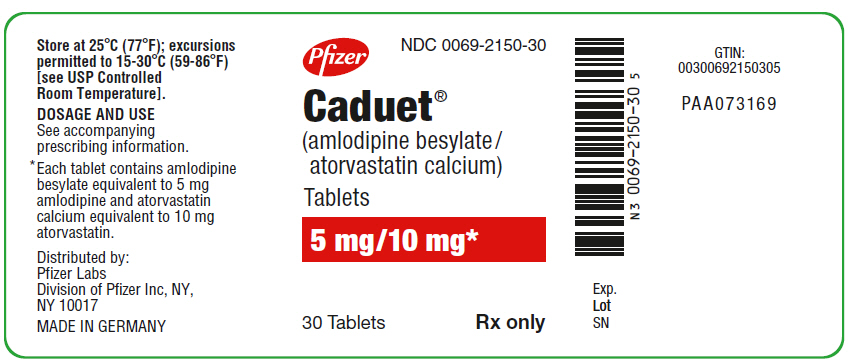
![]()
PRINCIPAL DISPLAY PANEL – 5 mg/20 mg Tablet Bottle Label
- Pfizer
NDC 0069-2170-30 - Caduet®
- (amlodipine besylate/
atorvastatin calcium) - Tablets
- 5 mg/20 mg*
- 30 Tablets
Rx only
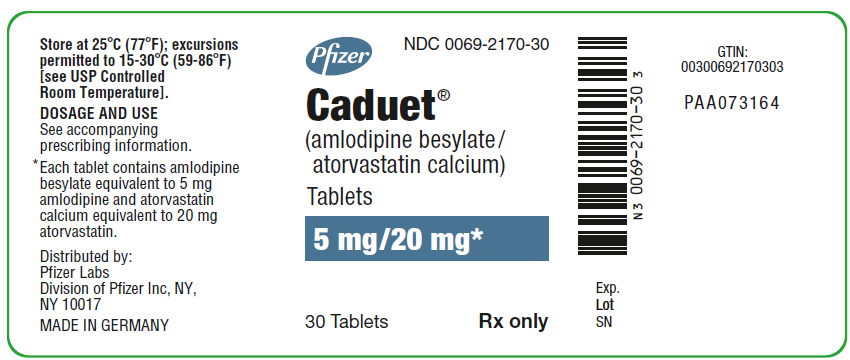
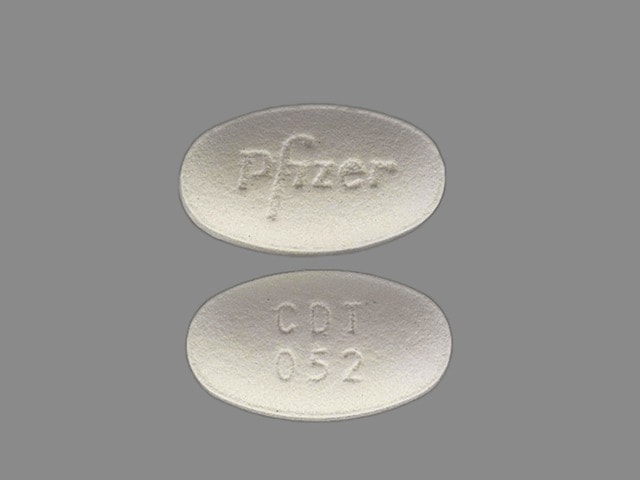
SRC: NLM .

